- Home
- Tony Parsons
Catching the Sun
Catching the Sun Read online
TONY PARSONS
Catching the Sun
For Yuriko and Jasmine
In sunshine and in shadow
‘… it was now too late and too far to go back, and I went on. And the mists had all solemnly risen now, and the world lay spread before me.’
Charles Dickens, Great Expectations
‘Do good – get good. Do bad – get bad.’
Thai proverb
Table of Contents
Title Page
Dedication
Epigraph
Part One: Swimming With Elephants
Chapter 1
Chapter 2
Chapter 3
Chapter 4
Chapter 5
Chapter 6
Chapter 7
Chapter 8
Chapter 9
Chapter 10
Part Two: Beach Dog
Chapter 11
Chapter 12
Chapter 13
Chapter 14
Chapter 15
Chapter 16
Chapter 17
Chapter 18
Part Three: The Young Man and the Sea Gypsy
Chapter 19
Chapter 20
Chapter 21
Chapter 22
Chapter 23
Chapter 24
Chapter 25
Chapter 26
Part Four: Song of the Gibbons
Chapter 27
Chapter 28
Chapter 29
Chapter 30
Chapter 31
Chapter 32
Author’s Note
Read on for one of Tony’s short stories from Departures
About the Author
Praise for Tony Parsons
By the same author
Copyright
About the Publisher
PART ONE
Swimming With Elephants
1
On the first day we watched the elephants come from the sea.
‘Look!’ Keeva cried. ‘Look at the sea!’
I sat up but I could see nothing. Just my daughter – Keeva, nine years old, stick thin, pointing out at a sea so calm it looked like a lake made of glass.
Tess, my wife, stirred beside me and sat up. She had been sleeping, worn out by a night in the air and coming seven thousand miles. We both watched Keeva, down where the sand met the water, excitedly waving her arms in the air.
I could actually see the heat. We were on the beach at Nai Yang, just after breakfast, and the air was already starting to shimmer and bend. I thought – If it’s this hot so early in the day, what will it be like later?
Keeva was jumping up and down by now.
‘Oh!’ she cried. ‘You must see it! Oh, oh, oh!’
Our boy, Rory, was between me and Tess, on his stomach, a wet and battered copy of My Family and Other Animals on his lap. He looked up at his twin sister, adjusting his glasses, impatiently shaking his head. Then his jaw dropped open.
‘Oh,’ he gasped.
Tess laughed, and stood up, brushing the sand from her legs, and all the exhaustion of the journey seemed to vanish with her smile.
‘Can’t you see them?’ she asked me, taking Rory by the hand as they began walking down to the sea.
Then it was suddenly there for me too, this thing poking out of the water, a gnarled tube moving towards the shore. It looked like some prehistoric snorkel. Then there was another one. Then two more. All these prehistoric snorkels, steadily moving towards Hat Nai Yang. And always getting bigger.
Everyone on the beach was looking out to sea now, and there was a collective gasp as the head of the first elephant broke the surface, its huge eyes blinking, the mighty head nodding, the beads of water flying from the ears. And then another. Then an entire family of elephants was marching out of the water, their mighty grey bulks rising out of the sea like gods from the deep. I saw the men on their backs, the mahouts, lean and brown and grinning, steering with their bare feet pressed behind the ears of the great beasts.
But really all we saw were the elephants coming out of the empty sea.
‘Wow,’ said Tess. ‘How did they do that, Tom?’
I shook my head. ‘I don’t know.’
I looked down the great sandy sweep of Hat Nai Yang. The beach was a perfect bow shape, and I guessed that somewhere beyond the curve in the bay there was a secluded spot where the mahouts slipped into the water to surprise the people further down the beach. But watching the elephants come out of the sea still seemed like more than a clever trick.
It felt like magic.
Keeva backed away from the elephants. They were out of the sea now, their giant feet contracting as they trod on the soft sand of Hat Nai Yang. She came running back to us.
‘Elephants can swim?’ Keeva said. ‘Elephants can swim, Daddy?’
‘Elephants are good swimmers,’ Rory said, blinking behind his glasses. ‘Like all mammals. Apart from apes and humans. They have to be taught to swim. The apes and the human do.’
His sister snorted with derision. ‘I swim good.’
Rory’s eyes never left the elephants. ‘But you had to be taught, didn’t you? And the elephants just know.’
Rory took my hand and we stood watching as Tess and Keeva walked down to the crowd that had gathered around the elephants.
There were four of the big beautiful brutes, being patted and petted and cooed over by the people on the beach. The bird-like chatter of Thai filled the air. It was a Sunday and Hat Nai Yang was popular with locals at the weekend. We were the only foreigners on the beach.
‘Looks like a family,’ Rory said.
‘Four of them,’ I said, smiling down at him. ‘Same as us.’
But his face was serious. He peered at the elephants and the blaze of the early morning sun turned his glasses into discs of gold.
‘They’re very floaty,’ he said thoughtfully. He looked up at me. ‘What do you call it? When something is very floaty?’
I thought about it. But he was faster than me.
‘Buoyant,’ Rory said. ‘Elephants are very buoyant mammals.’
We watched the crowd with the elephants. A young Thai woman in an old-fashioned swimsuit was lying on her belly and one of the elephants was softly patting her on the back and legs with one of its mammoth feet. The monster paw lingered over her buttocks, and seemed to think about it. The crowd roared with laughter.
‘She Yum-Yum,’ one of the elephant handlers shouted to me. This mahout, the one who had some English, was by far the oldest. They looked like a father and his three sons, and they all had lean, stringy bodies. Ropey muscles, bulging veins. Their skin was almost black from the sun. ‘Yum-Yum give massage,’ the old man called.
It did look like a massage. We watched the largest elephant carefully wrap its trunk around Keeva and lift her clean off the sand. She shouted with delight.
‘You want to do that?’ I asked Rory.
He shook his head. ‘They’re not meant to be clowns,’ he said. ‘Elephants are working animals.’
‘Oh, come on, Rory,’ I said.
‘They’re not here to entertain us,’ he said. ‘For some sort of show. Some sort of circus. They carried teak. Maybe these ones. Maybe these were the ones who carried the teak. Up in the mountains. Elephants are good in mountains.’
‘But this is work too,’ I said. ‘Maybe they prefer to do this than carry piles of wood around all day.’
He was not convinced.
‘Elephants are strong,’ he said. ‘Elephants are smart.’ He looked up at me through his glasses. ‘Now they have to muck about with Keeva, who didn’t even know that elephants can swim.’
I felt a flicker of irritation. Silently we watched the elephants moving into the sea. There w
ere children on their backs. Keeva was on the largest elephant, gripping its ears and laughing as it splashed into the water.
We watched the elephants gently crashing through the tiny waves that lapped the shore at Hat Nai Yang. Tess was smiling as she took a photograph of Keeva. The elephants were mugging for the cameras now. The one that my daughter was on dipped under the water and then surfaced. She gasped, eyes wide, trying to find some air before she could even think about laughing.
‘But they’re beautiful, aren’t they?’ I said, mostly to myself. ‘They’re beautiful.’
I wiped my fingers across my forehead. The sun was getting hotter.
When the sun was setting over the looking-glass sea, we found a small strip of seafood restaurants on the beach at Nai Yang.
We walked past them on the dirt road that ran by the beach, and we had no idea which one to choose. They all blurred into each other, a jumble of tables and chairs on the sand, candlelight flickering on the tables as night came quickly in, and they all had the day’s catch displayed at the beach entrance, fresh fish glistening in deep boxes of ice.
They were not much more than barns with no front and no back, straddling the road and the beach, and they all had curved wooden entrances wrapped with palm leaves. The doorways were just token gestures. There was nothing either side of them, and you could walk straight into any one of these places from the road or the beach or even the sea.
‘This one,’ Tess said.
The Almost World Famous Seafood Grill, a sign said in English.
The owner had strung fairy lights in the casuarina trees that rose between the tables. We stood there watching the lights twinkle green and red and blue, starting to feel the jet lag kick in, when an old Thai woman came out of the kitchen and took the children by the hand.
‘I’m Mrs Botan,’ she said. ‘Come with me, please.’
We watched the children go off with her, passing through the archway, also wrapped in fairy lights, and down the beach to a table at the edge of the sea. Tess and I looked at each other for a moment and then followed.
Mrs Botan parked us at our table and disappeared. We kicked off our shoes and wiggled our toes in sand that was more white than gold. The sun went down blood red and very quickly, and the green hill that rose over Nai Yang grew dark above the glassy bay.
I had never seen a sea so peaceful. It barely rippled when it touched the shore. There were no banana boats or jet skis out in the bay, just the longtails of the fishermen, thin and wooden and curved, like one-man Viking ships. They all had a single parking light, green or blue, and the lights nodded in the warm night air.
Without being asked, the old woman – Mrs Botan – came back with bottled water for the children and Singha beer for us. Then a waiter who was about eleven years old started bringing the food. An omelette stuffed with mussels. Giant barbecued prawns in sweet chilli sauce. A fish and vegetable curry. A huge plate of steaming rice.
Tess and Keeva began to tuck in. But Rory and I exchanged a look. I think we both felt overwhelmed.
‘And some bread,’ I told our child waiter.
The boy was startled. He stared at me for a while, looking worried, and then he raced off to fetch Mrs Botan.
‘Some bread, please,’ I asked her.
Mrs Botan furrowed her brow thoughtfully. She returned to the kitchen and I could hear excited voices. The clash of pans. Eventually she returned with a plate. And on the plate there were four thin slices of white bread.
‘Some bed,’ she said, and then she smiled, and gently patted the arms of my son and my daughter.
‘Your bread, sir,’ Tess said, reaching for a prawn the size of a lobster.
The bread was white and processed and at some point, although perhaps not recently, it had been purchased in a supermarket. Surrounded by the endless bounty of the Andaman Sea, the store-bought white bread looked like a rebuke.
Mrs Botan came back to make sure we were all right and to fuss over the children. Keeva preened and beamed, all poise and charm, but Rory was shifty and self-conscious, as if he thought himself unworthy of all the attention.
‘Enjoy your holiday,’ Mrs Botan said.
‘Oh, it’s not a holiday,’ Tess said, and she smiled at me.
I smiled back. No, it wasn’t a holiday.
It was work that had brought us to Phuket. We were here because of my new job and everything that came with it.
A new life. A better life. The chance to try again.
Tess did not say any of that to the owner of the Almost World Famous Seafood Grill. You can’t say any of that to someone you have just met, even if they are as nice as Mrs Botan.
But Tess smiled at me on Hat Nai Yang with the fairy lights glinting in the trees behind her, and the children ready for their beds, and the bone-white moonlight washing across the looking-glass sea, and it was all there in her smile.
2
I stood at the window waiting for the rain to stop. I looked at my watch and wondered how much longer it could last. The roads here scared me when it rained.
Keeva came and stood beside me and I put an arm around her shoulder. She was still warm from her bed.
‘It rains in Thailand?’ she said.
I heard Tess laugh at the table behind us. ‘It rains a lot in Thailand,’ she said. ‘Don’t you remember when we came here when you were little? How hard it rained?’
‘The day we fed the elephants,’ Rory said.
Keeva shook her head. ‘I remember the elephants,’ she said.
We had arrived on Phuket at the start of the long rains, although what I had seen of the weather forecasting on the island was so vague as to be useless. The storms often announced themselves, the sky flashing electric white, and then nothing happened, or it was happening on another part of the island, or out to sea. But when the rains fell on you the sky was full of water, warm hard rain that immediately soaked you to the skin, and all you could do was run for cover and wait.
Through the trees and out on the sea, I could see the stately progress of a longtail boat. As it turned to shore, the two-stroke engine lifted from the water, and the long metal pole that held it was secured in the air by twine. The solitary figure on board began pulling fishing nets from the bottom of the boat, and tossed them on the beach. Even from this distance you could see them moving with life.
The house we were living in was a villa in Nai Yang, on the green hill that sits high above the beach. It was one of two small houses that stood at the end of a dirt road. They both had double-gabled roofs, the typically Thai roof that looks as if it has a smaller version of itself on top, like a lovely echo. The only way to tell the two houses apart was that one of them had a red satellite dish on the roof. To the great disappointment of my children, that was our neighbour’s house.
Our neighbour was also our landlord – a fit-looking, elderly man with a face that seemed more Chinese than Thai. I had only met him once, when I collected the key on the first day, but I could see him at the window of the house next door now, watching the rain. He rented our place to Wild Palm, the property company where I worked as a driver.
Wild Palm staff were scattered across the island, but everyone else was a lot further south, around Phuket town and Ko Surin Tao and Ko Patong, close to the Phuket of travel brochures and dreams. But where we were, Nai Yang, was old Phuket.
This far north, surrounded by plantations of rubber and pineapple, forty years of tourism were wiped away and you could feel the centuries recede to when Phuket had been one of the world’s great trading posts.
It took thirty minutes to walk down the green hill to the beach, and yet the sea felt very close. You could hear it breathing in the distance against the bow-shaped beach of Hat Nai Yang and when the rain stopped and the sun broke through, the Andaman glittered blue and gold through the casuarina trees.
This was not a place to come for a holiday. It was inland, with a different, rougher kind of beauty, thick forest that you could hear dripping when it rained, and
the abandoned tin mines that dotted the landscape were a reminder that this had always been a place of sweat and toil and hard graft. This old Phuket was a place you came to look for a better life. A place to work.
I looked at my watch and decided I couldn’t wait any longer, whatever the rain decided to do. It was only my second week on the job and I wasn’t going to let a bit of rotten weather make me late.
As Keeva and Rory carried books to the kitchen table, preparing for their lessons, Tess came across and gave my arms a quick squeeze. I nodded because I knew she was telling me good luck, she was telling me to be careful, she was telling me that she would be thinking of me.
I kissed her lightly on the lips and went to the porch. Our neighbour was still at his window and his wife had joined him. She smiled and waved and I recognized her immediately as the owner of the Almost World Famous Seafood Grill. Of course. The landlord’s name was Botan too. Mr and Mrs Botan. Mrs Botan gave me an encouraging nod as I ran through the rain to a shed by the side of our house, skidding slightly on the rain-slick dirt. Mr Botan watched me and looked unimpressed.
There was an old motorbike in the shed. A 500cc Royal Enfield, made in India, the blue paint worn down to silver metal by the years and unknown riders, its frame freckled with rust. I wheeled it outside and looked up at Tess and Rory and Keeva standing on the porch, the children holding their books, the three of them looking from me to the sky. The rain seemed to be slowing down a touch, but I wondered if that was just my imagination.

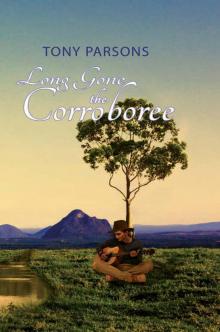 Long Gone the Corroboree
Long Gone the Corroboree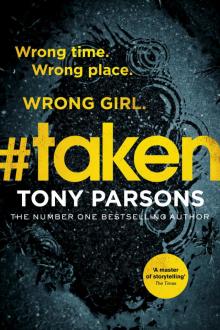 #taken
#taken The Family Way
The Family Way One For My Baby
One For My Baby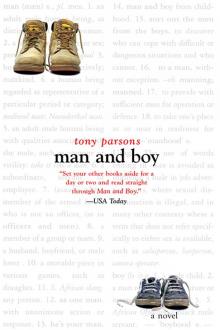 Man and Boy
Man and Boy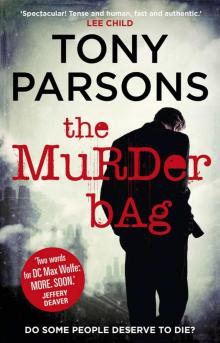 The Murder Bag
The Murder Bag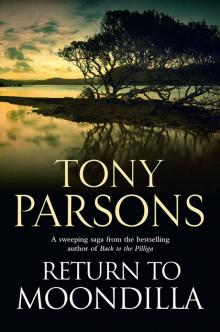 Return to Moondilla
Return to Moondilla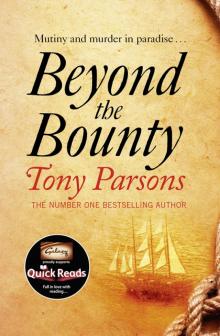 Beyond the Bounty
Beyond the Bounty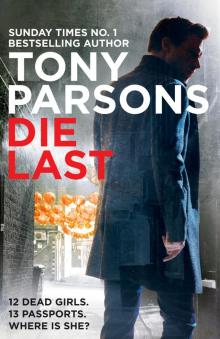 Die Last
Die Last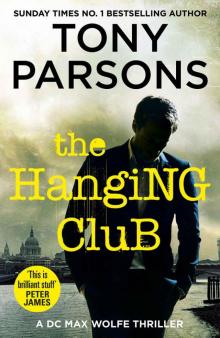 The Hanging Club (DC Max Wolfe)
The Hanging Club (DC Max Wolfe) Stories We Could Tell
Stories We Could Tell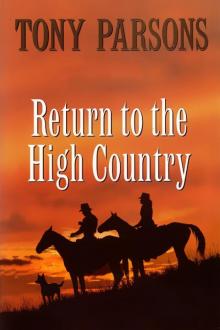 Return to the High Country
Return to the High Country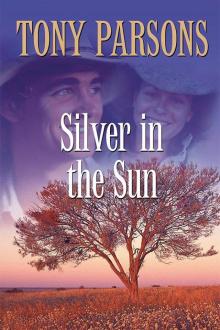 Silver in the Sun
Silver in the Sun My Favourite Wife
My Favourite Wife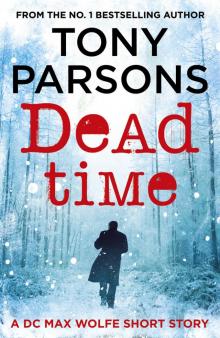 Dead Time
Dead Time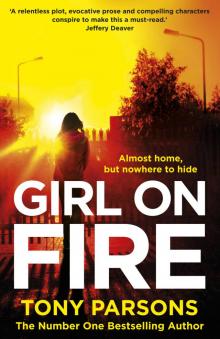 Girl On Fire
Girl On Fire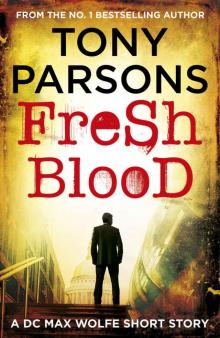 Max Wolfe 02.5 - Fresh Blood
Max Wolfe 02.5 - Fresh Blood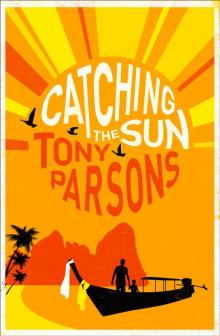 Catching the Sun
Catching the Sun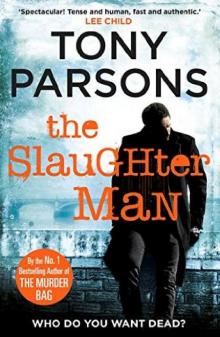 The Slaughter Man
The Slaughter Man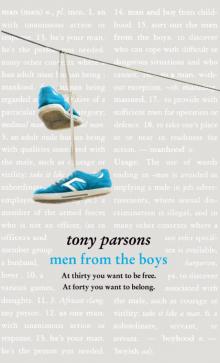 Men from the Boys
Men from the Boys Man and Wife
Man and Wife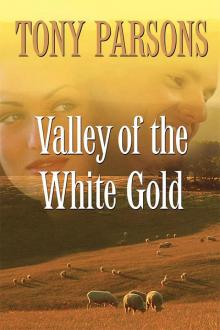 Valley of the White Gold
Valley of the White Gold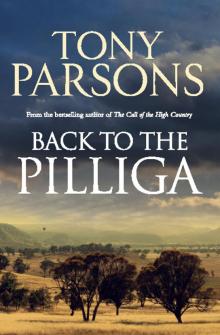 Back to the Pilliga
Back to the Pilliga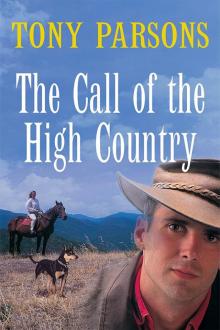 The Call of the High Country
The Call of the High Country Girl On Fire_DC Max Wolfe
Girl On Fire_DC Max Wolfe